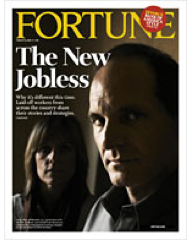Sometimes it’s better just to keep it simple, and in that spirit I give Fortune credit for profiling several unemployed people and illustrating the story on its cover with a photo of a downsized training-firm executive and his wife.
The photograph is quite arresting. The colors are all grays and browns; the husband is in sharp focus and closer to the camera, with the wife a few feet behind him and slightly out of focus, a bit like a specter. Yes, the symbolism relies on traditional gender roles (she depends on him, get it?), but the point is made. The expressions more or less tell the entire story—his is a combination of determination tempered by depression and worry. She’s just worried.

The introductory text is short and to the point. Here’s a bit of it:
Unlike previous downturns, this one is not confined to the tech or manufacturing sectors. It is the Equal Opportunity Recession, winding its way into every corner of the economy.
To put faces on the numbers, Fortune interviewed dozens of jobless people across the country. They are old and young, rich and poor, from rural Maine and urban California. They are your neighbor or your nephew. Or they are you.
Certainly, this is the story of the economy and will be for some time, so this was not a particularly daring choice for a cover. And certainly, the business press before too long will be struggling to tell the same story in different ways. Its creativity will be put to the test, I’m afraid. This is going to take a while.
But for now, the quotes of ordinary people help illustrate the uniquely isolating experience that a job loss represents as well as the disorientation that comes with it, particularly for people whose identity is closely linked to their work, which describes a lot of us, including this 56-year-old pig farmer:
“I grew up in this business,” says Gutz, who was once recognized by the state as a Master Pork Producer. “I don’t have anything else I can do. You feel like you’ve let your wife down, your family, your parents, you know? And you feel like other people are talking about you. It’s embarrassing. This was my whole world.”
And this 37-year-old mill worker and father of two:
“It hurts,” he says, staring out the window at his sons playing in the snow. “You drive by and know you’ll probably never drive in again, and that someday it won’t be there at all.”
That’s bad. Worse is the sense of foreboding Fortune’s subjects clearly feel as they calculate the odds of looking for work in an economy out of Mad Max. Those small humiliations are right around the corner, and these people know it.
Here is a 62-year-old former HR executive:
Career-counseling sessions, she says, are “like 100 unemployed 60-year-old people in a room looking at each other.”
Depressing, right? But you gotta get out there, or so we are told.
She recently endured a series of nine interviews with a medical company, only to be told that it had decided not to fill the position.
Then there is the prospect of taking one of those fabulous temp jobs—call-center work, etc.—that the economy produced by the bushel in recent decades as high-paying manufacturing jobs disappeared:
Mackey volunteered for the Obama campaign; then, out of money, she and Corbin [a boyfriend] decided to take temp jobs at Amazon. They lasted only four grueling nights.
Not all the profiles work that well—one about an unemployed Lehman vice president somehow failed to evoke much emotion around here.
But it’s a good, simple story, done well.
Dean Starkman Dean Starkman runs The Audit, CJR’s business section, and is the author of The Watchdog That Didn’t Bark: The Financial Crisis and the Disappearance of Investigative Journalism (Columbia University Press, January 2014). Follow Dean on Twitter: @deanstarkman.
